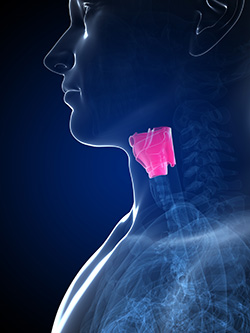Throat Cancer Treatment in San Fernando, CA

Throat cancer affects the hollow tube that starts behind the nose and ends at the voice box in the neck. This tube is known as the pharynx. Throat cancer can appear in the upper, middle, or lower end of this tube and sometimes cancers of the voice box are considered throat cancers.
You may hear your medical provider call throat cancer “pharyngeal” or “laryngeal cancer” depending on where the cancer is in the throat. About 26,000 adults are diagnosed with a throat or voice box cancer each year and about 6,000 people will die from the disease.
Throat cancer occurs 10 times more often in men than in women, but its rates are dropping by about 2-3% every year because fewer people are smoking. Survival rates for throat cancer will vary greatly depending on where the cancer is and how advanced it is at the time of diagnosis.1
Request throat cancer treatment information today: call (424) 365-1800 or contact Vitality Integrative Medicine online.
Throat Cancer Symptoms
Symptoms of throat cancer can include any combination of:
- Hoarseness that does not go away after a week or two
- High-pitched breathing sounds
- Trouble swallowing
- Coughing
- Coughing up blood
- Pain in the neck or ears
- Sore throat that does not get better, even if you have taken antibiotics
- Weight loss
- Lumps or swelling of the neck
Throat Cancer Causes and Risk Factors
The most common causes and risk factors of throat cancer include:
- You are a man
- You are over 65 years old
- You are African American
- You smoke heavily
- You drink heavily
- You have a history of HPV (human papilloma virus)
One way to prevent throat cancer is to avoid tobacco products (specifically smoking) and abusing alcohol. If you smoke or drink, stopping as soon as possible may help lower your risk of getting throat cancer. There is no standard screening test for throat cancer.
Throat Cancer Diagnosis
To diagnose throat cancer, your medical provider will likely start with a physical examination and gather some information about your medical history. You may have some numbing medicine sprayed in your throat so your doctor can use a small mirror on a long handle to look inside your pharynx. Other procedures to examine your throat include:
- Use of a special light to look more closely at the throat (laryngoscopy) while you are asleep.
- Removal of a small piece of tissue to look for cancer cells under a microscope (biopsy). Biopsy is the only way to accurately determine if you have cancer.
To determine if cancer has spread to other areas of the body, a medical provider may also conduct:
- MRI scans
- CT scans
- PET scans
- Chest X-rays
Cancers may be localized to just one small area of the throat, or may involve other surrounding tissue, lymph nodes or organs. Once all testing is completed, your provider may tell you what stage your cancer is. Staging helps communicate how advanced the cancer is and helps your medical team plan the proper treatments.
Throat Cancer Treatment
Throat cancers are treated based on their stage, location, and many other factors. Common treatments may include any combination of:
- Surgery
- Radiation
- Chemotherapy
- Medication targeted therapy
The goal of cancer treatment is to remove the cancer and prevent it from spreading to other parts of the body. In some cases, radiation may be enough to shrink a tumor. If the cancer has advanced, more radical procedures like removing the voice box may be needed.
Eating and getting the proper nutrition can be difficult when treating throat cancer. Some patients may need a feeding tube temporarily or permanently to deliver food and nutrients to the body until the patient can swallow again. Your medical provider may suggest a nutritionist or dietician to help guide food choices.
Throat Cancer Support
Being diagnosed with throat cancer can be frightening. This is normal and okay. If you can, take a friend or family member along to appointments and write down any questions you have for your provider.
Request information on diagnosis and treatment of throat cancer treatment today: call (424) 365-1800 or contact Vitality Integrative Medicine online.
1All statistics from American Cancer Society
Vitality Integrative Medicine
Address
4849 Van Nuys BlvdSuite 104
Sherman Oaks, CA 91403
(424) 365-1800
www.vitalityintegrative.com
Hours
Mon:
8:00 am - 6:00 pm
Tue:
8:00 am - 6:00 pm
Wed:
8:00 am - 6:00 pm
Thu:
8:00 am - 6:00 pm
Fri:
8:00 am - 6:00 pm
Sat:
8:00 am - 12:00 pm
